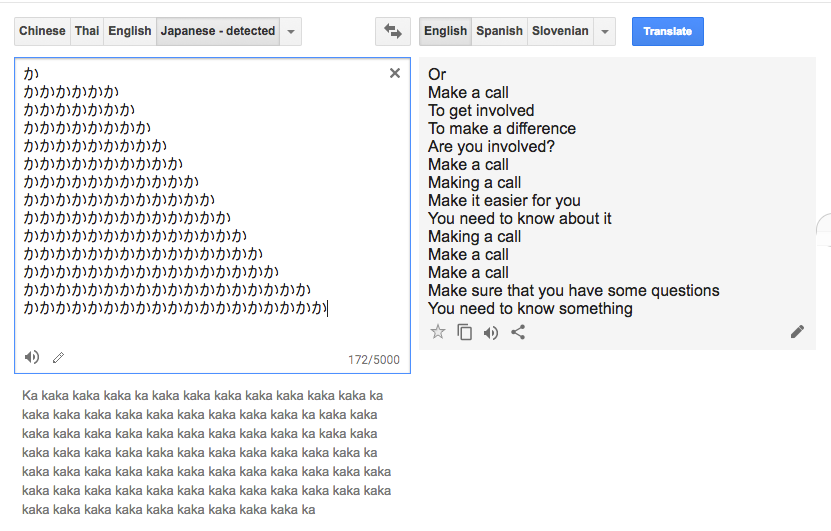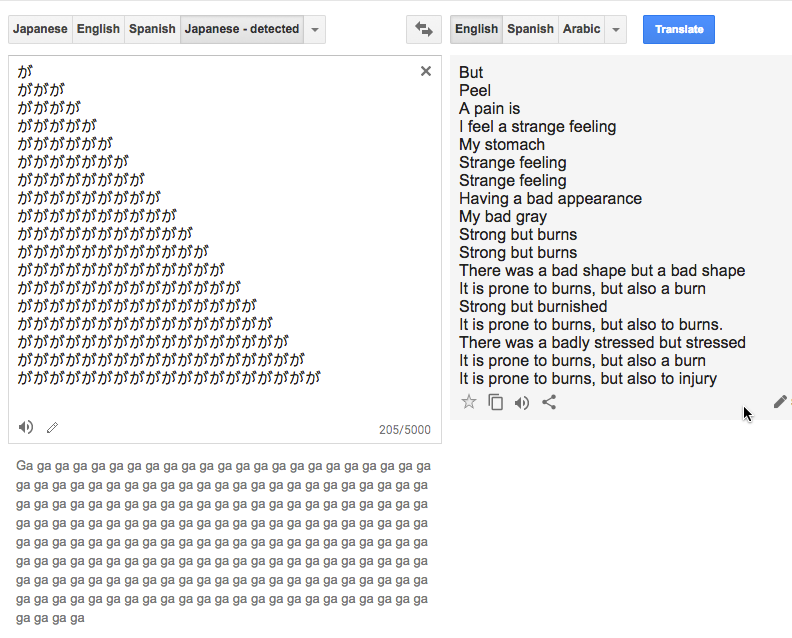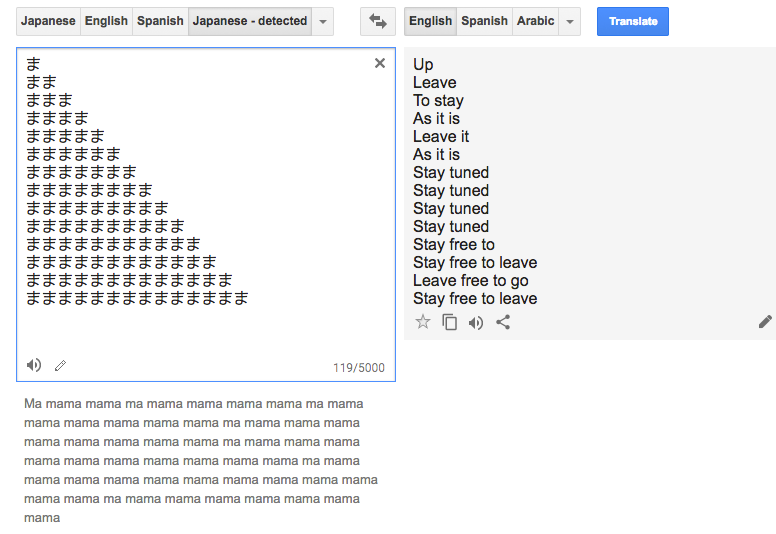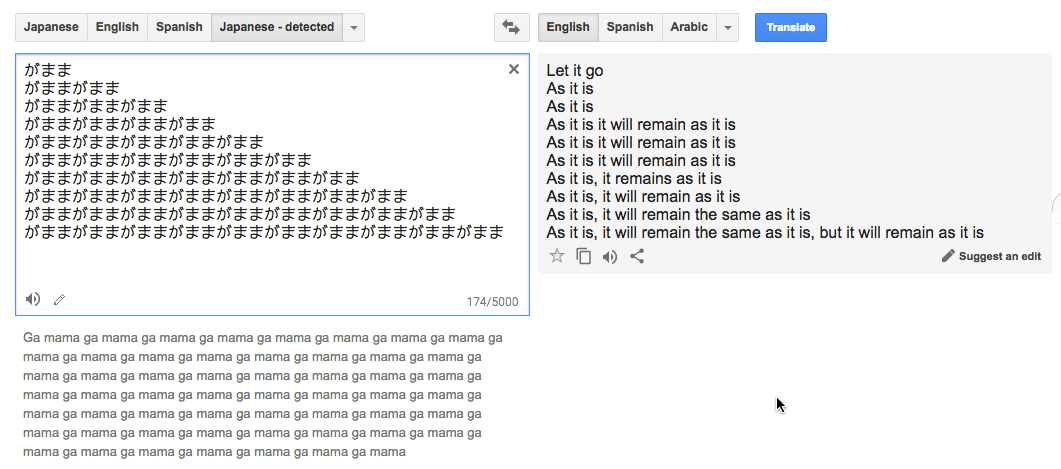You need to know something
« previous post | next post »
I'm happy to see that Google Translate is still turning (many types of) meaningless character sequences into spoken-word poetry. Repetitions of single hiragana characters are an especially reliable source — here's "You need to know something":
And "I feel a strange feeling":
And "Stay free to leave":
Repeated combinations also often work — here's repetitions of "Ga mama" rendered as "Let it go / As it is":
These works also often reveal some interesting things about the letter-to-sound part of Google's current text-to-speech algorithms, e.g. the performance of that last one:
And as usual, if you ask for it again, you get a performance that sounds like the system has had a drink or five:
Here are the inputs in case you want to try them:
か
かかかかかか
かかかかかかか
かかかかかかかか
かかかかかかかかか
かかかかかかかかかか
かかかかかかかかかかか
かかかかかかかかかかかか
かかかかかかかかかかかかか
かかかかかかかかかかかかかか
かかかかかかかかかかかかかかか
かかかかかかかかかかかかかかかか
かかかかかかかかかかかかかかかかかか
かかかかかかかかかかかかかかかかかかか
が
ががが
がががが
ががががが
がががががが
ががががががが
がががががががが
ががががががががが
がががががががががが
ががががががががががが
がががががががががががが
ががががががががががががが
がががががががががががががが
ががががががががががががががが
がががががががががががががががが
ががががががががががががががががが
がががががががががががががががががが
ががががががががががががががががががが
ま
まま
ままま
まままま
ままままま
まままままま
ままままままま
まままままままま
ままままままままま
まままままままままま
ままままままままままま
まままままままままままま
ままままままままままままま
まままままままままままままま
がまま
がままがまま
がままがままがまま
がままがままがままがまま
がままがままがままがままがまま
がままがままがままがままがままがまま
がままがままがままがままがままがままがまま
がままがままがままがままがままがままがままがまま
がままがままがままがままがままがままがままがままがまま
がままがままがままがままがままがままがままがままがままがまま




GH said,
October 25, 2017 @ 5:40 am
Am I hearing right that it's saying "it will remain the same as it I.S.A. sit is", ignoring the word and line divisions on "is / as it"? How bizarre.
[(myl) Yep.]
Victor Mair said,
October 25, 2017 @ 7:18 am
As long as there's a Google Translate, it will continue doggedly, robotically to try its best to make sense of nonsense (and, of course, of sense, and of everything between sense and nonsense). That's its job, its duty. That's what it was built for. That's its raison d'être.
By its very nature, Google Translate will obediently deal with whatever is thrown at it.
[(myl) The displayed behavior is a feature of some MT methods and not others. And programs for analyzing user feedback are quite good at detecting various forms of "keyboard banging".
Human translators are also supposed to deal with whatever is thrown at them, but they don't act this way.]
Sigurd said,
October 25, 2017 @ 8:26 am
An English translation of the lyrics of Dutch 90s house hit 'Þþþþþlak!':
þþþþlak.
þþþþlak?
þþþþlak!
þþþþþþþþlak.
þþþþþþþþlak?
þþþþþþþþlak!
þþþþþþþþþþþþþlak.
þþþþþþþþþþþþþlak?
þþþþþþþþþþþþþlak!
þþþþþþþþþþþþþþþþþþþlak.
þþþþþþþþþþþþþþþþþþþlak?
þþþþþþþþþþþþþþþþþþþlak!
þþþþþþþþþþþþþþþþþþþþþþlak.
þþþþþþþþþþþþþþþþþþþþþþlak?
þþþþþþþþþþþþþþþþþþþþþþlak!
þþþþþþþþþþþþþþþþþþþþþþþþþþlak.
þþþþþþþþþþþþþþþþþþþþþþþþþþlak?
þþþþþþþþþþþþþþþþþþþþþþþþþþlak!
þþþþþþþþþþþþþþþþþþþþþþþþþþþþlak?
þþþþþþþþþþþþþþþþþþþþþþþþþþþþlak!
þþþþþþþþþþþþþþþþþþþþþþþþþþþþþþþþþþlak?
þþþþþþþþþþþþþþþþþþþþþþþþþþþþþþþþþþlak!
þþþþþþþþþþþþþþþþþþþþþþþþþþþþþþþþþþþþþlak?
þþþþþþþþþþþþþþþþþþþþþþþþþþþþþþþþþþþþþlak!
þþþþþþþþþþþþþþþþþþþþþþþþþþþþþþþþþþþþþþþþlak?
þþþþþþþþþþþþþþþþþþþþþþþþþþþþþþþþþþþþþþþþlak!
——————————————–
tincture.
smoothly?
smooth!
thinness.
soothy?
soothy!
as close as possible.
so close?
so close!
as close as possible.
how close?
as close as possible!
as close as practicable.
how close?
how hard it is!
both at the same time.
how hard are they?
they're so hot!
how hard they are?
the people that are so close!
how hard are these?
the people that are so close to the people!
how hard they are at the same time?
the more common of those who are so close!
more widely used by people?
more closely with them!
Victor Mair said,
October 25, 2017 @ 8:56 am
If an intelligent human being is asked to translate nonsense / gibberish, they will most likely reject the job.
If an intelligent human being is forced to translate nonsense / gibberish, they will simply transcribe or transliterate it into the script of the target language.
[(myl) And it would be very easy to program an MT system to do either or both of those things — to remark that the input seems to be character-repetition or random sequences of character fragments, and/or to propose a translation that roughly replicates the input.
The reasons that this doesn't happen in current Google Translate (and in some other systems) involve an interesting story about the machine-learning methods involved, not simply a decision to "doggedly try to make sense of nonsense".]
E.T said,
October 25, 2017 @ 10:39 am
I was having a go at this yesterday, and it struck me that this is similar to the LSD-like images demonstrated by Google’s Deep Dreams.
My understanding, assuming that this is the result for an artificial neural network, is that certain patterns are embedded in the parameters (the weights) that act as transmitters between units (nodes, neurons) in the neural network – the model creating these. Where the visual network of Deep Dreams may insert its impressions of dogs or cars into an image, the model in this instance conjures up common phrases in response to certain stimuli.
Another fun thing to do is to find a video of a Korean talk show on YouTube and turn on machine transcription and translation. This tends to generate discussions relating to fiscal policy, elections, business and medicine, which of course simply reflects the material the model is trained on.
bratschegirl said,
October 25, 2017 @ 10:52 am
Are you involved?
You need to know something.
I feel a strange feeling
Strong but burns
Stay free to leave;
As it is, it will remain as it is
——–
I await word of my NEA grant; also, the appearance of "Stay free to leave" on New Hampshire's license plates.
Morgan said,
October 25, 2017 @ 12:34 pm
Here's a Spanish->English one I like because it can be read as plaintive self-reference or as a strangely astute paraphrase:
nononononononononononononononononononononononononononononononononononononononononononononononononononononononononononononononononononononononononono
->
I do not know what to do. I do not know. I do not know. I do not know. I do not know.
stedak said,
October 25, 2017 @ 2:43 pm
@Victor Mair: Making sense of nonsense is not its job. Its job is to advertise Google's paid service, with which "websites and applications can integrate with Translation API for fast, dynamic translation". Sounds like their market is vendors who want their online catalogs to be updated automatically. The selling points are *fast and dynamic*, not *guaranteed correct*, and implicitly it's meant for interactive use where if the seller's offer comes out gibberish, you have a chance to go around again.
I don't think anyone's mentioned yet that if you hover the mouse and "click to edit and see alternate translations" you get a more literal translation which is ungrammatical garbage, instead of hallucinatory poetry. Thus the last line of the last Japanese example becomes "Mamagamama but leave Mom is Mom is Mom Mom Mom Mom Mom Mom Mom".
These hallucinatory outputs are alluring because they invite experimentation, trying to figure out the black box and control it, yet it continues to generate surprises. Plus, it raises the question: *why* do these accidents feel poetic? The English translations seem to have a lot of alliteration (strange… stomach… strong… shape… stressed). I wonder if its corpus mixes vocabulary lists with connected text, so it thinks that words that are close alphabetically should appear together.
Goueznou said,
October 25, 2017 @ 6:04 pm
GH, I think it's saying "… I.S. / A's it …" — that is, the abbreviation for the Islamic State, followed by the plural of the letter A.
Christopher Henrich said,
October 25, 2017 @ 8:41 pm
@myl (replying to Victor Mair) "The reasons that this doesn't happen in current Google Translate (and in some other systems) involve an interesting story about the machine-learning methods involved…"
I, for one, would indeed be interested in that story.
leoboiko said,
October 26, 2017 @ 12:43 am
Wow, I think their poetry skills have improved considerably. There are actually doable for singing.
Quim said,
October 26, 2017 @ 3:10 am
These menus are from (detected) Estonian. It is not poetry, but "[edit] Noun" and "[edit] Etymology" suggest that the training set includes some linguistics webpages… Or what does it suggest?
üüü -> buy
üüüüüüü -> one way menu
üüüüüüüüü -> opt-in menu
üüüüüüüüüü -> youtube
üüüüüüüüüüü -> nude menu
üüüüüüüüüüüüü -> opt-in menu
üüüüüüüüüüüüüü -> ıllını ıllıı
üüüüüüüüüüüüüüü -> an incl
üüüüüüüüüüüüüüüü -> nude
üüüüüüüüüüüüüüüüü -> a set of menu items
üüüüüüüüüüüüüüüüüü -> nail
üüüüüüüüüüüüüüüüüüü -> native
üüüüüüüüüüüüüüüüüüüü -> nouveau
üüüüüüüüüüüüüüüüüüüüü -> [edit] Noun
üüüüüüüüüüüüüüüüüüüüüü -> native
üüüüüüüüüüüüüüüüüüüüüüüü -> [edit] Etymology
Lars said,
October 26, 2017 @ 9:18 pm
The [edit] part makes me think it comes from a wiki, either Wiktionary or Wikipedia.
Leon Derczynski said,
October 27, 2017 @ 5:00 am
Don't forget えぐ !
https://www.youtube.com/watch?v=3-rfBsWmo0M
Angie said,
October 30, 2017 @ 9:40 am
I was inspired by this google spoken word poetry going around and incorporated it into some of my artist books. I made a volume for Thai, Japanese and Greek. I was trying to uncover the range of source documents for the algorithm. Most of the inputs I used were nonsense, but it was intriguing to compare the type of text returned. For instance compared to this poetic example from your post, Greek text returns chemical compounds and business documents – mostly related to UN documents it seems.
The books and some examples are on my site: http://www.unknownunknowns.org
Titles: The Unfolded Folded (Thai), Starting with the Beginning (Greek), Please Wait for the Showdown (Japanese).